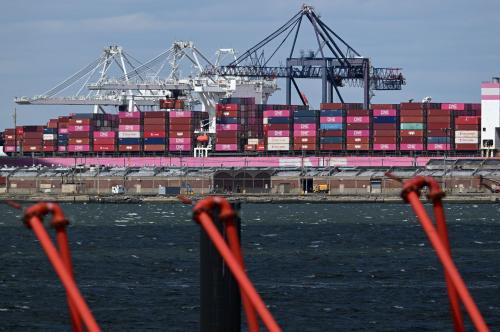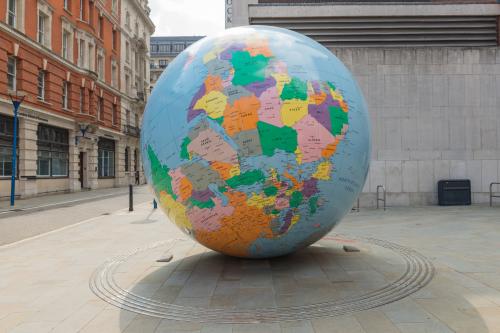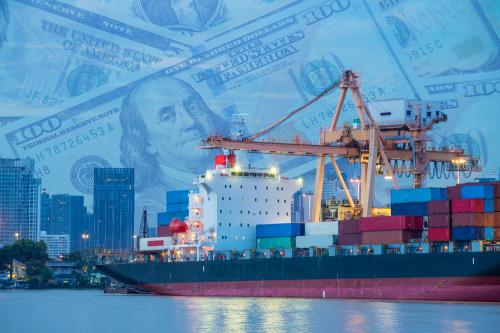Editor’s Note:
In a new article, Paul Blustein provides an in-depth account of the collapse of the World Trade Organization’s Doha Round of global trade talks in July 2008, based on interviews with top officials, revealing new insights into what went wrong and what lies ahead for global trade. Blustein is a Journalist in Residence at Brookings and is working on a book on the WTO.
Support for this article was generously provided by the German Marshall Fund of the United States and the Hewlett Foundation.
To those who know him, Pascal Lamy is one of the least likely men on Earth to lose his composure in a room full of people. The 61 year-old Lamy, who is Director-General of the World Trade Organization, is cerebral and almost ascetic in his self-discipline; he runs marathons and sustains himself during periods of stress by eating nothing but bananas and brown bread. A top graduate of France’s elite National School of Administration, he rose to a senior position in the civil service of the European Commission, where he was nicknamed “the Exocet” for his focus on policy and the icy manner in which he enforced his boss’s will on other bureaucrats. He served a term as the European Union’s trade commissioner before winning election to head the WTO in 2005.
But on the afternoon of July 29, Lamy was coming to grips with an enormous personal disappointment as he met with three dozen trade ministers from WTO member countries in the organization’s Geneva headquarters. It was the ninth day of a ministerial meeting, the longest by far in the trade body’s history, which Lamy had convened in hopes of achieving a breakthrough in the Doha Round of global trade talks. Grueling negotiations among a core group of seven powerful members had failed to produce an agreement, and as Lamy presented this news he choked up, stunning the ministers and his subordinates, who had never seen him display such emotion.
“The round has broken down,” Lamy said, according to notes of the meeting. Unable to continue, the Director-General halted to take a sip of water as his sadness permeated the room. Steadying himself, he said that differences on one issue in particular were apparently “irreconcilable,” and he urged the ministers to “please refrain from the blame game.”
Sometimes, the true implications of an event only start to come into focus well afterwards. So it is for last July’s collapse in the Doha talks. At the time, the news evoked many shrugs, even from trade experts—and understandably so, because it was hardly the first setback for the round, which has dragged on for seven years. Memories of the July debacle faded quickly, as upheaval in financial markets seized the world’s attention. Now that the bottom has fallen out of the global economy, who cares anymore that the WTO’s member nations couldn’t strike an agreement four months ago?
But the financial crisis has greatly magnified the import of that failure. As the turmoil starts to weaken the “real” economies of many countries, the WTO’s July meeting can be seen, in retrospect, as a potentially calamitous stumble for economic globalization.
The specter of widespread protectionism, which seemed almost laughably remote in recent years, suddenly looms as a much more serious threat. Up to now, it has been easy to dismiss worries that the world might descend into trade wars like those of the 1930s, when America’s Smoot-Hawley tariff triggered a disastrous cycle of retaliation and counter-retaliation. Those fears look a lot less far-fetched now that recessionary forces are spreading to every major region of the world. The resultant rise in unemployment and bankruptcy is bound to generate intense pressure on politicians to raise trade barriers. In the United States, such pressures will be all the greater because the plunge in many foreign currencies—from the Korean won to the Brazilian real to the South African rand—will make imported products much cheaper.
The groundswell of revulsion against unfettered capitalism so far has been aimed at the system governing flows of money; it is unlikely to spare the system governing the international flow of goods and services. The recent Group of 20 summit pledged to refrain from enacting protectionist measures, but initial signs underscore the flimsiness of that commitment. No sooner had the leaders left Washington than Russia announced it was going ahead with plans to raise substantial duties on imports, especially foreign cars.
By turning down the deal that was under consideration in July, WTO members passed up the opportunity for a meaningful insurance policy against protectionism. The package of measures, though hardly the bonanza for global growth that its boosters often claimed, could have prevented countries from erecting significantly higher tariffs. Meanwhile, the precipitous change in the economic climate has dimmed prospects for a Doha accord anytime soon, because as economies slump, political resistance will stiffen against the dismantling of trade barriers and subsidies. For the long-run health of the multilateral trading system, the ultimate safekeeper of open world markets, the implications are ominous.
This article provides an in-depth account of the July meeting, based on interviews with top-ranking participants from major countries, WTO officials, and other attendees, a number of whom furnished extensive notes that they took of the most important sessions. It is a tale that shows multilateralism both at its most high-minded and at its most dysfunctional—the low points including a tantrum by Japan’s trade minister and an F-word-laden outburst aimed at Lamy by Susan Schwab, the U.S. Trade Representative. More importantly, it sheds new light on what went wrong in Geneva—and how far wrong things went.
Exploring these events is crucial, partly to hold officials and their governments properly accountable for their roles, but also to assess the prospects for reviving the Doha Round. Like penitents seeking redemption, the G-20 summiteers instructed their trade ministers to return to the negotiating table with the aim of completing a detailed blueprint for the Doha Round this year, and Lamy may summon ministers to Geneva again in mid-December. This decision came after a number of leaders, among them President Bush, expressed their eagerness to try again at achieving what the July meeting couldn’t, even before the end of Bush’s term. Their optimism is based on a version of events that gained wide currency after July, namely that negotiators came tantalizingly close to striking a deal on the main elements of the round, and that their failure was attributable almost entirely to discord over one technical matter, which involved poor countries’ rights to raise emergency tariffs when their farmers are deluged by imports.
Unfortunately, from the interviews with insiders, a very different picture emerges—that of a meeting that fell far short of the consensus required by WTO rules for an accord. It is true that at one stage, hope soared that WTO members might converge around a compromise sketched out by Lamy. But despite initial support for the package from Schwab, powerful U.S. farm and industrial groups were profoundly dissatisfied with it, as were leading members of Congress. The U.S. team, anxious to ascribe fault to others, accused China of “walking away” from the deal after having first accepted it—but the Americans were the ones who could most accurately be described as abandoning it. Opposition from India, meanwhile, was if anything even more vehement than previous accounts have suggested.
All this bodes very poorly for completing the Doha Round in its present form. Beyond the foregone benefits, the round’s travails pose significant risks to the WTO itself.
For all its flaws, the WTO is a crucial lynchpin of stability in the global economy. It is the current embodiment of the multilateral trading system that was established after World War II to prevent a reversion to the thirties. The WTO’s rules keep a lid on the import barriers of its 153 member countries, and members take their trade disputes to WTO tribunals for adjudication rather than engaging in tit-for-tat retaliation. That keeps trade wars from erupting, just as any rule-of-law system helps contain tendencies toward the law of the jungle. In addition, the WTO is the guardian of the “most favored nation” principle, under which member nations pledge to treat each other’s products on a nondiscriminatory basis—a valuable bulwark against trade blocs of the sort that, during the thirties, stoked rivalries among the great powers.
The WTO’s centrality to the global trading system is already under some doubt, thanks to the proliferation in recent years of bilateral and regional trade agreements. More than 400 of these are currently in force, ranging from the big and well-known such as NAFTA, to the small and ridiculous such as the Singapore-Jordan free trade agreement. Governments are increasingly tempted to think of these pacts as reasonable substitutes for multilateralism, especially as disillusionment deepens with the WTO’s ability to foster new deals. Although the WTO is not about to disintegrate overnight, the danger is that its authority will erode to the point that member nations will start to flout their commitments and ignore the rulings of WTO tribunals. That would greatly increase the threat of trade wars and a breakdown in the system that has helped keep trade blocs and protectionism at bay.
The policymakers who gathered in Geneva in July were well-versed in long-term worries about the trading system; indeed, many voiced them. Such weighty concerns, however, will only take trade ministers so far when they have vital domestic political interests at stake.
To continue reading, please download the complete article >>
The Brookings Institution is committed to quality, independence, and impact.
We are supported by a diverse array of funders. In line with our values and policies, each Brookings publication represents the sole views of its author(s).



Commentary
The Nine-Day Misadventure of the Most Favored Nations: How the WTO’s Doha Round Negotiations Went Awry in July 2008
December 5, 2008